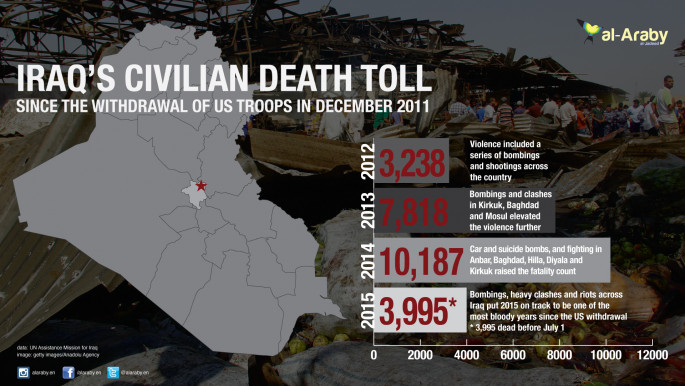Abadi on the ropes as Maliki re-enters the ring
With the return of former Iraqi Prime Minister Nouri al-Maliki to Iraq comes new problems for the current leader of the country, Haider al-Abadi.
After a week-long visit to Iran, Maliki's plane bounced down on the tarmac of Baghdad airport on Thursday, and a crowd of well-wishers were there to greet the embattled politician.
He appeared defiant, and some saying that his stay in Iran has rubbed off on him.
"Wahhabis, the West and Israeli" were to blame for the recent assault on his privileges, Mailiki told the crowd. But they would not dissuade him from continuing his journey, he continued.
Exile returns
Although Maliki has been marginalised by Abadi's recent popular reforms - and his position as vice-president terminated - the scene at the airport shows that he still has many powerful allies in Iraq.
Chief among these are the paramilitary groups of the Popular Mobilisation Forces, a militia alliance set up to confront the Islamic State group, back when Maliki was leader.
It has become a formidable paramilitary force and has performed better than the national army in several battles with the extremists.
Many Maliki loyalists inside the force - often considered the most extreme of the mostly Shia militias - are positioned inside the green zone, where the Iraqi parliament is based.
"Maliki's return to Iraq means his victory over Abadi, who had attempted to politically marginalise him by opening his corruption cases… so he could not re-enter Iraq," an official in the leading National Alliance parliamentary bloc told our Arabic service correspondent.
Sources inside Maliki's Islamic Dawa Party disclosed to al-Araby al-Jadeed Arabic that, during his visit to Iran, Maliki met with the Supreme Leader Ali Khamenei.
 |
| Iraq's civilian death toll [Click to enlarge image] |
The grand ayatollah told him to return to Iraq and deal with the problems he faces in Iraq. Before Maliki left, the source alleges that Khamanei gave him assurances that he would not face prosecution if he returned to Iraq.
"Maliki has delivered a knock-out blow to Abadi after gaining renewed Iranian support and guarantees of immunity in the corruption cases he has been accused of… Iranian guarantees are more powerful than the Iraqi judiciary and law," the National Alliance official said.
Political consequences
Last week, Maliki was on the ropes. A parliamentary report into finding out who was accountable for the loss of Iraqi territory to IS in June 2014 put the former prime minister at the top of the list of culprits.
The file was passed to state prosecutors, and Maliki could ultimately face legal action from civil and military courts for his role in the abysmal performance by the Iraqi military in June.
Both court structures have the power to sentence Maliki to death if he were found guilty.
Firas al-Ithawi, an Iraq analyst, told al-Araby al-Jadeed Arabic that Iranian support effectively vetos any decisions by the Iraqi authorities - including charges they might use to pursue Maliki.
| The Iraqi people are angry and want to eliminate corruption - Firas al-Ithawi, Iraq analyst |
"The Iraqi people are angry and want to eliminate corruption," he said.
"Referring these cases to court is difficult if not impossible, and Abadi cannot deliver this."
Ithawi puts the way Maliki returned to Iraq unhindered - despite Abadi allegedly slapping travel bans on a number of associates of the former prime minister - as proof that the prime minister is helpless to stop him.
"Maliki could take advantage of the popular anger to rally his supporters and try to oust Abadi's government," he added.
| More: The heat of protests in Iraq forces government reforms - read Zana K Gul's commentary here |
Popular protests
Abadi's reforms were implemented on the back of popular protests against corruption and power cuts during a heat wave in Baghdad and the Shia south.
Grand Ayatollah Ali al-Sistani - a hugely influential religious figure - helped mobilise the crowds with a demand to expose corrupt officials.
Abadi will find it more difficult to slow down his anti-corruption drive after Sistani warned that, unless "substantial reforms" were carried out, Iraq would face partition.
This could be seen as a veiled threat to Abadi that he must continue with his reform programme and cream off the top of the corrupt Iraqi bureaucracy.
Iraqis have grown tired of rampant corruption. Despite owning the world's fifth-largest oil reserves, few in the country have seen much return on the billions of dollars being made. The security situation is also dire, even after billions more have been spent on arms and training.
Falling oil prices and the war on IS - along with rampant corruption - have left a black hole in Baghdad's coffers.
Iraq is trying to raise $6 billion in its first bond issue, to make up for a massive financial deficit this year.
Along with a divisive political landscape and a possible slowing of Abadi's anti-corruption drive, Iraqis will be expected to further tighten their belts after another grim year.





 Follow the Middle East's top stories in English at The New Arab on Google News
Follow the Middle East's top stories in English at The New Arab on Google News


